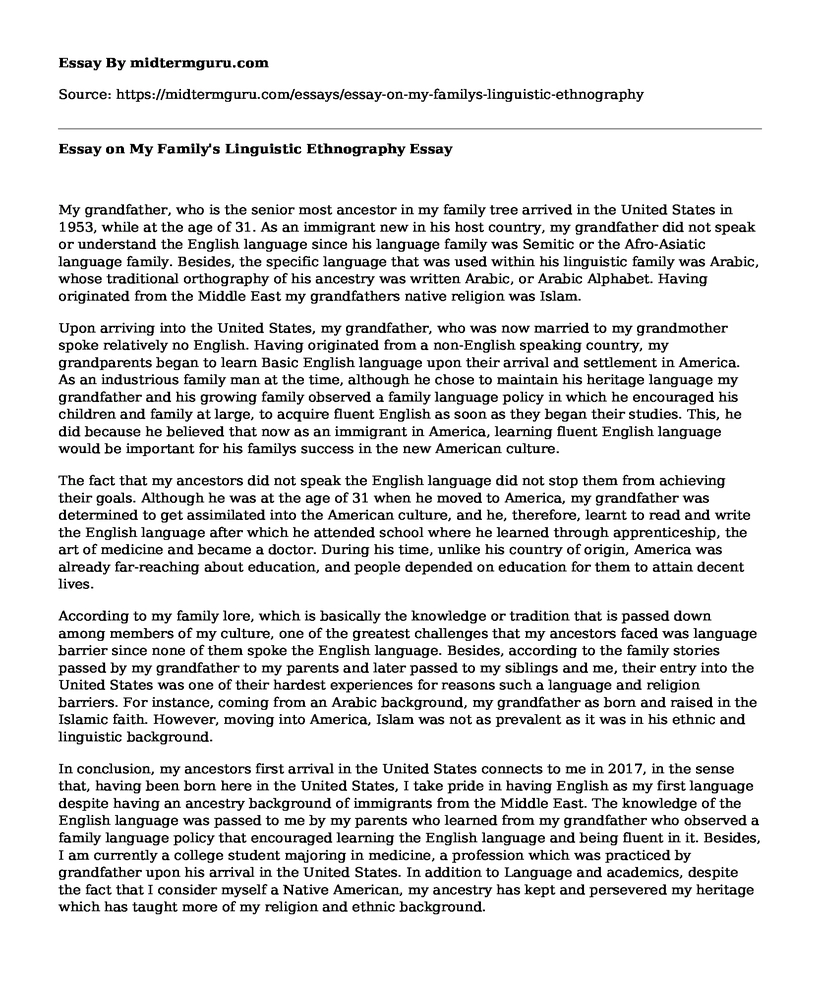My grandfather, who is the senior most ancestor in my family tree arrived in the United States in 1953, while at the age of 31. As an immigrant new in his host country, my grandfather did not speak or understand the English language since his language family was Semitic or the Afro-Asiatic language family. Besides, the specific language that was used within his linguistic family was Arabic, whose traditional orthography of his ancestry was written Arabic, or Arabic Alphabet. Having originated from the Middle East my grandfathers native religion was Islam.
Upon arriving into the United States, my grandfather, who was now married to my grandmother spoke relatively no English. Having originated from a non-English speaking country, my grandparents began to learn Basic English language upon their arrival and settlement in America. As an industrious family man at the time, although he chose to maintain his heritage language my grandfather and his growing family observed a family language policy in which he encouraged his children and family at large, to acquire fluent English as soon as they began their studies. This, he did because he believed that now as an immigrant in America, learning fluent English language would be important for his familys success in the new American culture.
The fact that my ancestors did not speak the English language did not stop them from achieving their goals. Although he was at the age of 31 when he moved to America, my grandfather was determined to get assimilated into the American culture, and he, therefore, learnt to read and write the English language after which he attended school where he learned through apprenticeship, the art of medicine and became a doctor. During his time, unlike his country of origin, America was already far-reaching about education, and people depended on education for them to attain decent lives.
According to my family lore, which is basically the knowledge or tradition that is passed down among members of my culture, one of the greatest challenges that my ancestors faced was language barrier since none of them spoke the English language. Besides, according to the family stories passed by my grandfather to my parents and later passed to my siblings and me, their entry into the United States was one of their hardest experiences for reasons such a language and religion barriers. For instance, coming from an Arabic background, my grandfather as born and raised in the Islamic faith. However, moving into America, Islam was not as prevalent as it was in his ethnic and linguistic background.
In conclusion, my ancestors first arrival in the United States connects to me in 2017, in the sense that, having been born here in the United States, I take pride in having English as my first language despite having an ancestry background of immigrants from the Middle East. The knowledge of the English language was passed to me by my parents who learned from my grandfather who observed a family language policy that encouraged learning the English language and being fluent in it. Besides, I am currently a college student majoring in medicine, a profession which was practiced by grandfather upon his arrival in the United States. In addition to Language and academics, despite the fact that I consider myself a Native American, my ancestry has kept and persevered my heritage which has taught more of my religion and ethnic background.
Cite this page
Essay on My Family's Linguistic Ethnography. (2021, Jun 25). Retrieved from https://midtermguru.com/essays/essay-on-my-familys-linguistic-ethnography
If you are the original author of this essay and no longer wish to have it published on the midtermguru.com website, please click below to request its removal:
- School Counselors and Student Confidentiality Essay Example
- Relationship Between English Language and Spanish Language - Paper Example
- Research Paper on College Student-Athletes and Academic Success
- Essay Sample on Social and Pragmatic Factors Influencing Thou and You
- Early Childhood Interest in Law - Essay Sample
- Media's Ubiquitous Presence in Children's Lives: Impact and Transformation - Essay Sample
- Free Tuition for Public College Students: A Solution for Higher Completion Rates - Essay Sample







